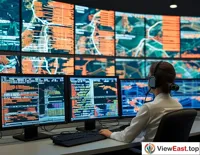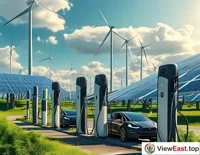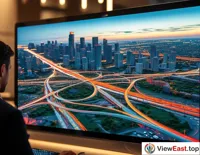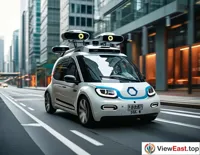







China's artificial intelligence (AI) technology is uniquely powering profound changes in the field of transportation. From the testing and pilot operation of autonomous vehicles to the widespread application of intelligent traffic management systems, China has achieved a series of remarkable accomplishments in the area of intelligent transportation. This article will showcase the significant progress China has made in AI-driven intelligent transportation transformation through a series of compelling examples and stories.
1. The Leap in Autonomous Driving Technology
Chinese tech companies have made significant progress in autonomous driving technology. Baidu's "RoboTaxi" commercial autonomous ride-hailing service not only improves travel efficiency but also reduces the need for manual driving. The successful testing of these autonomous vehicles on urban roads lays a solid foundation for future unmanned driving technology.
2. Widespread Application of Intelligent Traffic Management Systems
Chinese cities are increasingly adopting intelligent traffic management systems to improve urban traffic fluidity and sustainability. These systems integrate traffic data, intelligent traffic lights, and traffic monitoring technology, providing powerful tools for urban planning and management. Some Chinese cities have become models for intelligent traffic management systems, offering valuable experience for other cities.
3. Leading in Electric Vehicles and New Energy Technology
China's battery manufacturing technology is at the forefront of the world, providing a reliable power source for the continuous development of electric vehicles. The development of electric vehicles and new energy technology not only drives the green revolution in the transportation sector but also provides new power for intelligent transportation systems.
4. Progress in In-Car AI Assistants and Connectivity Technology
Chinese car manufacturers have made progress in in-car AI assistants and connectivity technology. They apply artificial intelligence, voice recognition, and big data analysis to the interior of vehicles, creating a more personalized and intelligent driving and riding experience. These technologies have become an attractive feature of China's car market.
5. Rapid Growth of the Smart Transportation Market
According to data released by the China Intelligent Transportation Systems Association, in 2022, China's smart transportation market size reached 213.3 billion yuan, and it is expected to exceed 400 billion yuan by 2026, with an average annual compound growth rate of around 16%. This data fully demonstrates the rapid growth and huge potential of China's smart transportation market.
6. The Impact of AI Technology on Urban Traffic Planning
The rapid development of AI technology is reshaping the technological pathways of urban traffic planning, making the traffic planning process more intelligent and automated. AI technology can optimize traffic signal control, public transportation scheduling, etc., through real-time monitoring and data analysis, to achieve intelligent operation of the transportation system.
7. Traffic Planning under the New Urbanization Strategy
Under the framework of China's new urbanization strategy, urban-rural integration and equalization of public services have become core goals of urban planning. The development of AI technology provides technical support for achieving these goals, such as remote medical care, online education, and intelligent transportation services covering more remote areas through digital means, promoting integrated urban-rural development.
8. The Social Impact and Value Orientation of AI Technology
The social impact of AI technology cannot be ignored, especially in terms of job replacement issues that may arise from autonomous driving technology. With the promotion of unmanned driving technology, many traditional driving jobs may be replaced by autonomous driving systems, which means that a large number of workers engaged in travel services will face the risk of unemployment.